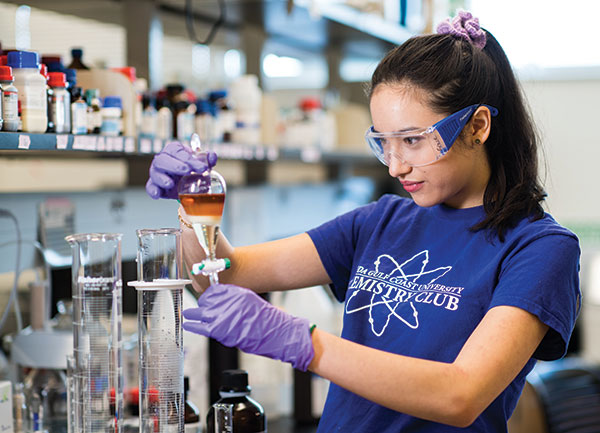
The coronavirus has affected everyone in one way or another. And the FGCU family certainly felt the impact in the form of online classes and commencements, canceled athletics events, a number of students, faculty and staff who came down with the virus as well as economic hardships.
But through it all, Eagles found ways to pick themselves up and create good out of a bad situation. Here are just a few of the ways FGCU students, faculty, staff and alumni did just that.
Eagles lend a hand making sanitizer for public safety
An FGCU chemistry professor’s idea to make potent hand sanitizer in the chemistry research lab has yielded a winning formula for helping the community while inspiring students to put their knowledge and skills to work for the greater good.
Since March, Associate Professor Arsalan Mirjafari and three undergraduate research assistants turned ingredients donated by the chemistry lab into more than 21 gallons of hand sanitizer.
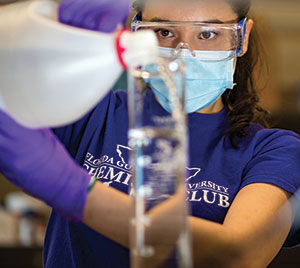 “Each of us has a responsibility to support our community – not just health workers – that’s why we started this project,” said Mirjafari.
“Each of us has a responsibility to support our community – not just health workers – that’s why we started this project,” said Mirjafari.
Created with a World Health Organization formula, the FGCU-made hand sanitizer was distributed through the Physical Plant, as well as departments that interact with people or products the most, with any surplus being distributed to area hospitals.
For student volunteers Grace Anderson, Isabella Riha and David Siegel, the project serves as an opportunity not only to hone lab techniques, but to experience firsthand how their work as scientists can positively impact society.
“This whole project came about because we wanted to use our resources,” said Anderson. “How do we do that? Well, we can help our community in a very effective, immediate way by making hand sanitizer.”
FGCU and RESTART SWFL work to restore consumer confidence
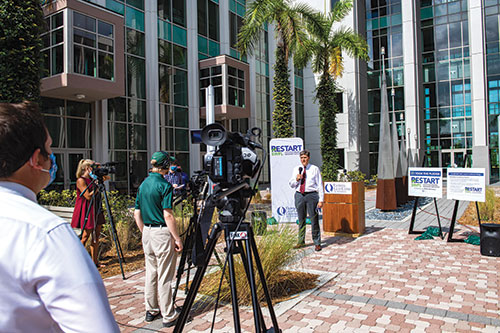
As COVID-19’s impact continues to be felt on the economy, FGCU’s Lutgert College of Business and Marieb College of Health & Human Services are helping local businesses along the path to recovery. The RESTART SWFL initiative is dedicated to helping businesses respond to the impact of the pandemic on their operations, workforce, vendors and customers. Since its launch in May, 55 pledges hang in the doorways of area businesses ensuring they are ready for customers.
“We know that good health makes good business, so it makes sense for FGCU’s Lutgert College of Business and Marieb College of Health & Human Services to unite to mobilize expertise and resources, along with those of our local partners, to help businesses,” said Christopher Westley, dean of FGCU’s Lutgert College. “Our intention is to create an environment in which consumers will feel more comfortable to re-enter the marketplace.”
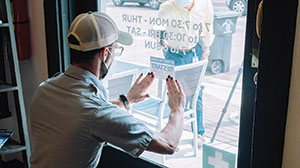
Along with the pledge, FGCU launched a series of free web-based discussions led by experts from Lutgert and Marieb, as well as community leaders. These assisted businesses in complying with new standards in hygiene and best practices for business. The goal is to assure customers that establishments have sound systems in place to ensure their well-being and are providing fair value and service.
The two colleges partnered to combine efforts to benefit the public. Businesses are more likely to open safely by instituting health measures that can protect customers and employees. Westley is looking toward the future with hope.
“Things will get better,” he said. “We’re here to help this process along.” For details, visit fgcu.edu/Restart
Piano student strikes a chord with Music to Breathe
Fernando López Flores couldn’t return home to Bolivia this summer because of pandemic travel restrictions, but the FGCU junior found another way to reach South America.
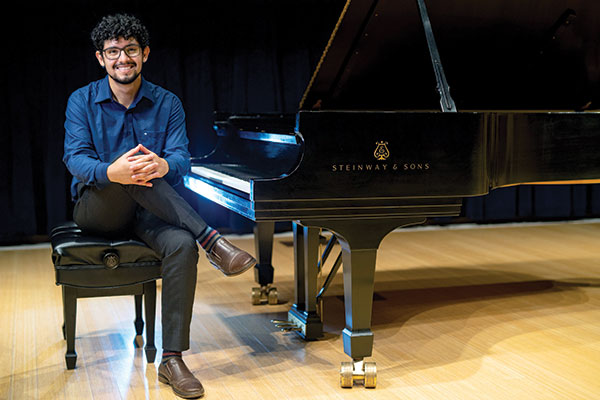
Along with 13 other members of The Bolivian Chamber Music Society, the 26-year-old pianist performed cell-phone concerts via WhatsApp that brought melodic comfort to COVID-19 patients and their families and stressed healthcare workers in Bolivia. The around-the-clock music marathon, called Musica Para Respirar 24/7 (Music to Breathe), debuted Aug. 10-17 and engaged almost 800 viewers in 355 concerts over about 8,000 total minutes, López Flores said. Sessions orchestrated via social media ranged from five minutes to two hours, with the players taking requests and chatting with listeners during 12-hour shifts.
“We wanted to find some way to support them,” said López Flores, a native of Sucre, Bolivia. “Music to Breathe represents the fight that we are trying to win. What this virus takes away from you is the capacity to breathe – at a very intense level. We all 14 of us truly believe music has the power to heal the soul, mind and body. We really think what we do can make a difference.”
As word of the project spread, additional musicians offered their services and requests for concerts poured in from neighboring South American countries. The monthly weeklong programs will continue at least through December, said López Flores, who studies under Professor Michael Baron with support from the Charles Lussenhop and Kayetta Slocum Scholarship and the Nisita Fund for Music Excellence.
“He’s one of our best ambassadors of the school of music and a great representation of what FGCU is all about,” said Bower School of Music Director Krzysztof Biernacki. “He’s extremely well liked by everyone. He’s one of those students who gets involved with anything.”
In one of his more memorable Music to Breathe recitals, López Flores played Bach, Beethoven and traditional Bolivian music for a woman recovering from COVID-19. But from his practice room in FGCU’s Music Building, the music major sensed he wasn’t quite connecting. When he asked what she’d like to hear as a finale, she hesitated at first before suggesting the accomplished pianist play “Twinkle, Twinkle, Little Star.”
“She told me it was the only piece she had played on the piano when she was little and that was her nicest memory from childhood,” López Flores said. “I played it for her, and she was so happy.”[/vc_column_text][vc_video link=”https://www.youtube.com/watch?v=o529USEJuw4″][vc_column_text]
FGCU engineers lead virtual summer camps despite pandemic
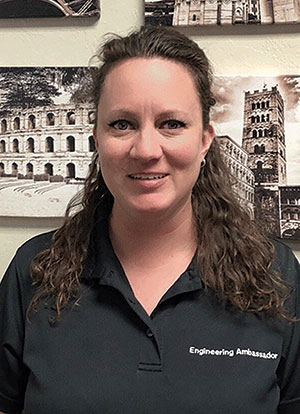
Despite COVID-19, spring and summer semester at FGCU successfully continued remotely. That’s why no less than 10 summer camps also were successfully orchestrated from a distance by Campus Conference Programs.
One of those camps was the inaugural BEaM (Bootcamp for Engineering and Mathematics) program. It offered two, 10- day sessions throughout June by the U.A. Whitaker College of Engineering and the Department of Mathematics and helped 35 incoming freshmen develop the math proficiency and study skills they’ll need in engineering and construction management coursework.
“We created a class in Canvas, and the professors either pre-recorded or conducted live lessons along with activities,” said Julie Rose, outreach specialist for the engineering college. “We boxed up all the supplies and shipped them to each student so they could engage in the activities from home. The students were then able to work on their skills with the support of a student mentor/tutor to improve their math skills before starting classes in the fall.”
The mentors — FGCU engineering students entering their senior year — met with program participants via Zoom. In addition to the lessons, students met with their department chairs, got a virtual tour of the engineering facilities and learned about resources on campus.
Rose says the results of this camp have been far beyond quantitative. The new freshmen are connecting on campus this fall, creating study groups and cultivating friendships.
“We are looking forward to this program being offered each summer to support incoming engineering freshmen. Hopefully next year it will be in person,” Rose said.
Tech-savvy Eagle uses 3D printers to help shield healthcare heroes
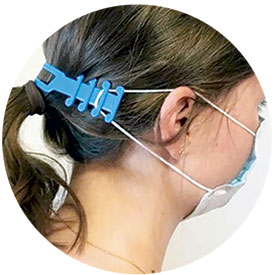 Scott Presbrey spent part of his spring semester 3-D printing, assembling and donating facial shields while continuing his classes online in his Fort Myers home. For the FGCU bioengineering student, it is personal. He was inspired to step up production by family connections in healthcare.
Scott Presbrey spent part of his spring semester 3-D printing, assembling and donating facial shields while continuing his classes online in his Fort Myers home. For the FGCU bioengineering student, it is personal. He was inspired to step up production by family connections in healthcare.
“I have family who work on the front lines, and I know they were in desperate need,” he said.
Presbrey donated more than 700 face shields to Lee Health facilities across Lee County. But as supplies became more readily available, Presbrey shifted from shields to ear savers for masks. The strap is made to remove all the pressure of the elastic bands pulling on your ears, so mask fatigue and ear pain are decreased.
For every purchase on his Etsy shop, Presbrey donates ear savers to healthcare workers. More than 500 have been donated so far.
“Using my skills and talents to develop a helpful tool for healthcare workers has been a fulfilling process,” he said.
Prof’s dashboard provides healthy dose of COVID-19 info
Information on COVID-19 – helpful and otherwise – spreads at a pace that seems as rapid as the virus itself. Tom Felke, FGCU associate professor of social work, has the expertise and patience to cure this dilemma by organizing data into something that’s easy to navigate, timely and accurate.
“I saw the state Department of Health dashboard and realized it’s for the entire state of Florida,” he said. “I thought we could develop our own version using the same data but target it more to Southwest Florida.”
The result: The Southwest Florida COVID-19 Information & Resources Dashboard. It uses up-to-date information from the Florida Department of Health in an easy-to-navigate format so users can pick a county and find out such things as the number of cases, testing sites and resource agencies.
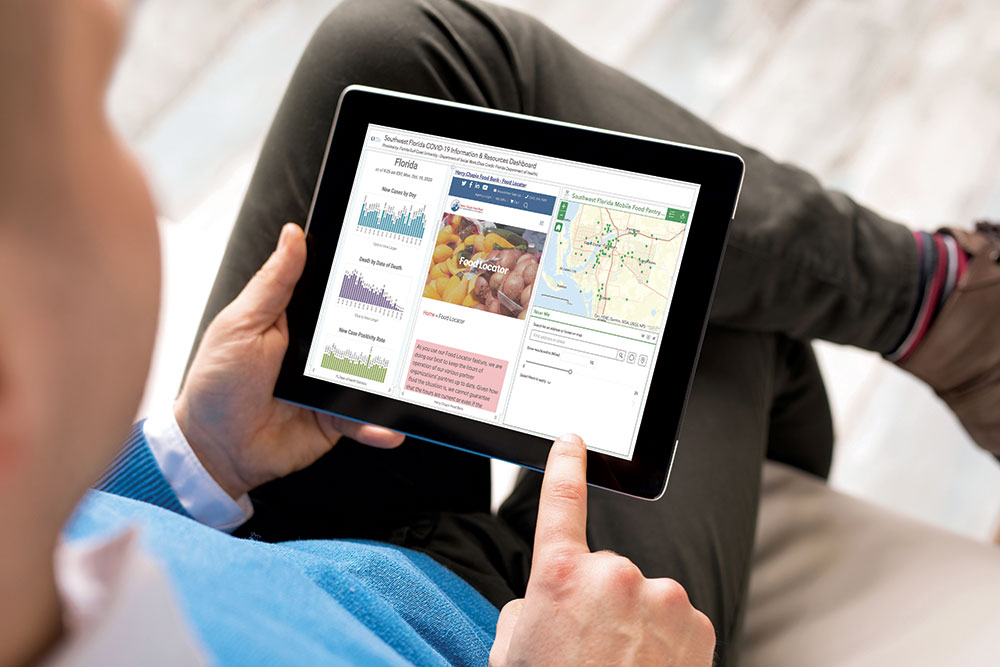 “We’re trying to put everything in one place so people can comprehend what’s going on when there is so much uncertainty right now,” said Felke.
“We’re trying to put everything in one place so people can comprehend what’s going on when there is so much uncertainty right now,” said Felke.
The dashboard continues to be updated as Felke knows COVID-19 is far from over. Resources are also being added as services change, and distributed to those who need it most.
“We want to be able to provide information to individuals that they can trust, count on and understand is accurate up to the point that we have it,” Felke said. Access it at fgcu.edu/ mariebcollege/socialwork/covid-dashboard
Community Counseling Center stays in touch through telecounseling
Sessions at the Community Counseling Center (CCC) at FGCU are now remote, but the focus is on keeping people connected. As the COVID-19 pandemic continues, the CCC recognizes the need for mental health counseling. The center is accepting new clients for telecounseling sessions to help them navigate challenges from the comfort of their homes.
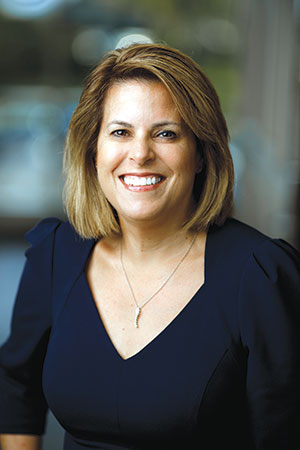
“This is an opportunity for us to talk and come up with ways to make sure we are connecting with others,” said CCC Director Alise Bartley.
Counselors saw their last clients in person at the CCC March 14. Within two days, sessions began online. Students are back at the CCC this fall, and are continuing to conduct virtual sessions with clients.
“It is beautiful to see the synergy and how they are working together,” said Bartley. “They are making certain they are physically distant, safe with their masks and wiping everything down.”
The CCC conducted a study comparing client experience in face-to-face sessions versus virtual. They found clients got better at the same rate. As the pandemic continues, Bartley hopes those struggling will feel comfortable asking for help.
“Many of us haven’t had to struggle with mental and emotional disorders,” said Bartley. “Because of the vast changes we have had to make in our lives, people are really struggling with depression and anxiety, and it’s ok.” For details, visit fgcu.edu/communitycounseling
FGCU grad’s distillery lifting spirits by producing hand sanitizer instead of rum
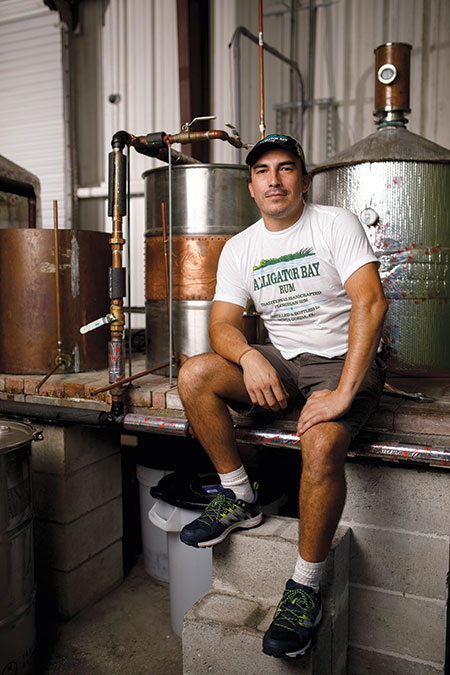
Hundreds of distilleries and breweries across the country, including one FGCU alumnus-owned company based in Southwest Florida, converted production from rum to antiviral liquid. Alex Voss (’08, Marketing) and his brother, Ben Voss, own Alligator Bay Distillers in Punta Gorda, focused on mixing sanitizer this spring that could help stop the spread of coronavirus.
“We are using the formula approved by the FDA and created by the World Health Organization,” Alex Voss explained. “The formula includes the alcohol at no less than 91 percent concentration with an added mixture of glycerin, hydrogen peroxide and reverse-osmosis water. The bottled sanitizer is 80 percent concentration.”
In three months Alligator Bay donated 5,000 gallons of hand sanitizer to first responders, hospitals and assisted living homes throughout Southwest Florida. The remainder is being bottled and sold at the Marion Avenue distillery by the gallon and 4-ounce bottle.[/vc_column_text]